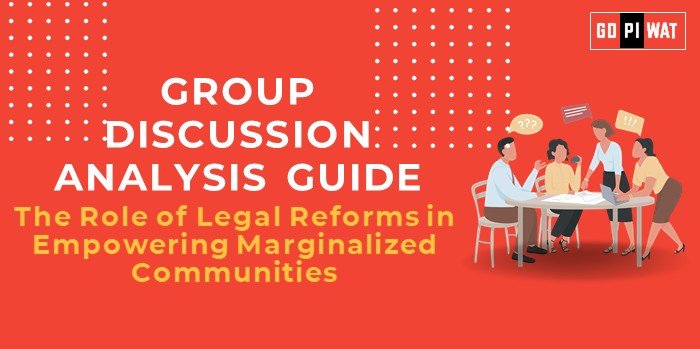📋 Group Discussion (GD) Analysis Guide: The Role of Legal Reforms in Empowering Marginalized Communities
🌐 Introduction to the Topic
Opening Context: Legal reforms have historically served as powerful tools for addressing inequality and promoting justice. For marginalized communities, such reforms are not just policy adjustments but lifelines that shape access to rights, opportunities, and dignity.
Topic Background: Legal reforms aim to update or replace existing laws to address societal inequities, including those based on caste, gender, economic status, and geography. From the abolition of untouchability in India to affirmative action in education and employment, these reforms have been instrumental in fostering empowerment.
📊 Quick Facts and Key Statistics
- Reservation in Education and Jobs: Scheduled Castes (SCs) and Scheduled Tribes (STs) receive 15% and 7.5% reservations in public sector jobs and educational institutions, respectively.
- Legal Aid Coverage: National Legal Services Authority (NALSA) ensures free legal aid to nearly 70% of India’s population.
- Child Marriage Decline: After the enactment of the Prohibition of Child Marriage Act (2006), child marriages in India dropped by 50% (UNICEF, 2022).
👥 Stakeholders and Their Roles
- Government: Drafts, enforces, and monitors legal reforms.
- Judiciary: Ensures interpretation and application of laws to uphold justice.
- NGOs: Assist in awareness and implementation at grassroots levels.
- International Bodies: Provide guidelines, funding, and monitoring (e.g., UN Women’s role in gender-related reforms).
- Communities: Advocate for and participate in legal reforms.
📈 Achievements and Challenges
✨ Achievements:
- Economic Empowerment: SC/ST entrepreneurs have received loans worth ₹22,000 crore under the Stand-Up India scheme.
- Gender Justice: Triple Talaq Bill (2019) protects Muslim women from instant divorce.
- Land Rights: Forest Rights Act (2006) empowered 1.8 million tribal families with land ownership.
⚠️ Challenges:
- Implementation Gaps: Poor enforcement of the SC/ST (Prevention of Atrocities) Act in remote areas.
- Judicial Delays: High pendency rates undermine the efficacy of legal protections.
- Social Resistance: Widespread stigma and discrimination persist despite legal safeguards.
🌍 Global Comparisons
- South Africa: Post-apartheid reforms focus on affirmative action and land redistribution.
- United States: Civil Rights Act (1964) set a benchmark for anti-discrimination laws.
📜 Case Studies
- Kerala’s Land Reforms Act (1969): Eliminated feudal land systems, benefiting Dalits and Adivasis.
- SEWA (Self-Employed Women’s Association): Aided marginalized women through legal support and advocacy.
🗣️ Structured Arguments for Discussion
- Supporting Stance: “Legal reforms, such as reservations in education and employment, have transformed millions of lives, ensuring representation for marginalized groups.”
- Opposing Stance: “Despite progressive laws, implementation gaps and societal resistance continue to hinder real change.”
- Balanced Perspective: “While legal reforms have significantly empowered marginalized communities, their full potential remains untapped due to systemic challenges.”
🎯 Effective Discussion Approaches
- Opening Techniques:
- Historical angle: “Since independence, legal reforms in India have aimed to dismantle caste-based and gender-based inequalities.”
- Case-driven: “The Forest Rights Act is a prime example of how reforms can empower tribal populations.”
- Counter-Argument Handling: Acknowledge systemic issues but highlight ongoing initiatives and successful models.
🔍 Strategic Analysis: SWOT
- Strengths: Legislative intent, judicial backing, grassroots awareness.
- Weaknesses: Corruption, low awareness among beneficiaries.
- Opportunities: Digital legal aid, participatory lawmaking.
- Threats: Rising populism, rollback of progressive policies.
💼 Connecting with B-School Applications
- Real-World Applications: Exploring CSR initiatives that focus on legal empowerment or proposing reforms in operational frameworks.
- Sample Interview Questions:
- “How do legal reforms impact inclusive growth?”
- “Suggest ways to improve the efficiency of affirmative action policies.”
- Insights for Students: Study the interplay of law, business, and society; research sustainable legal frameworks.


